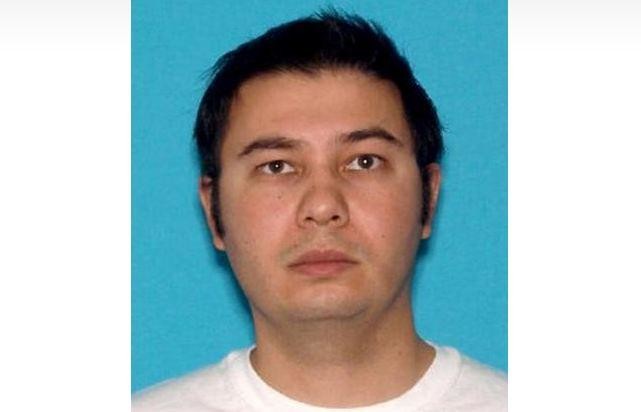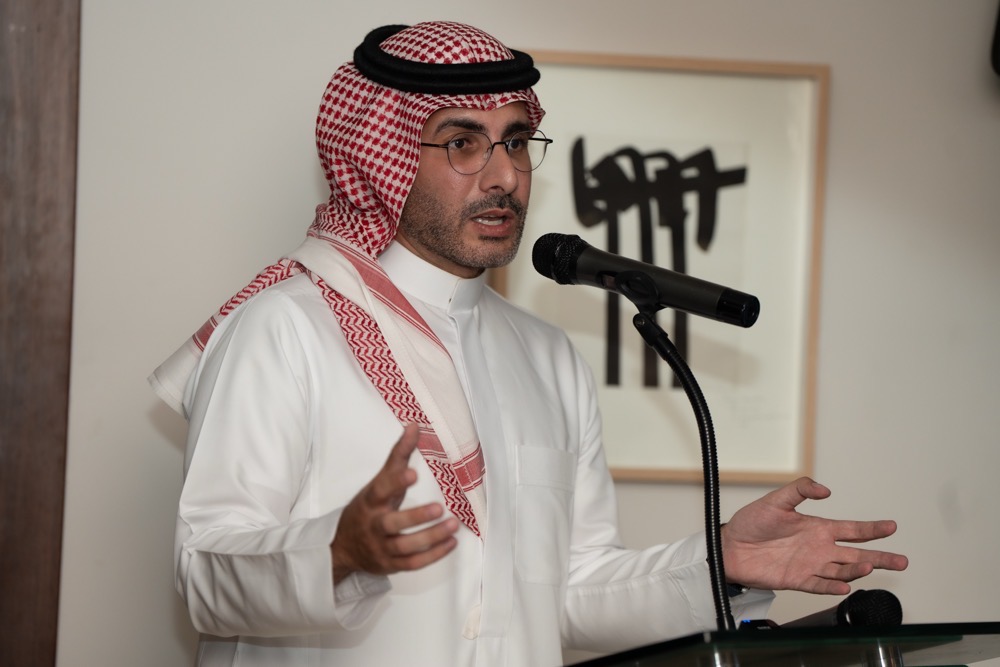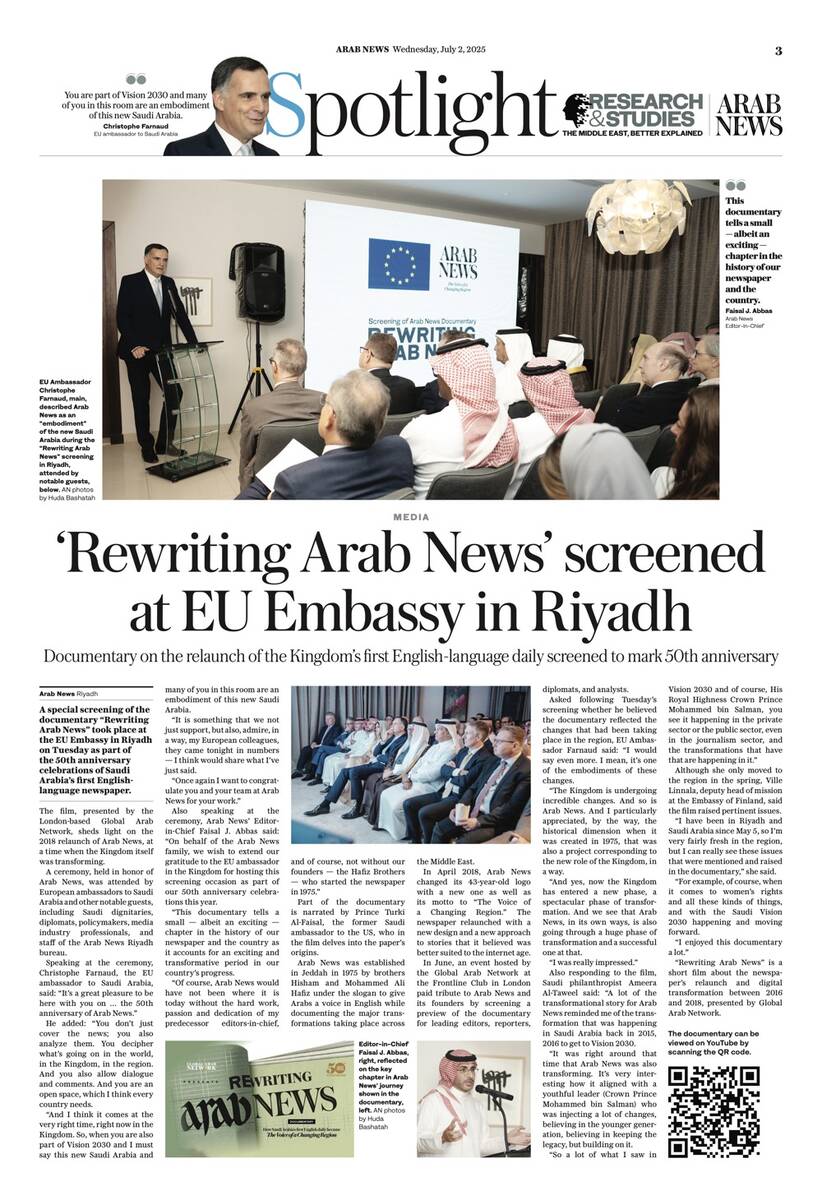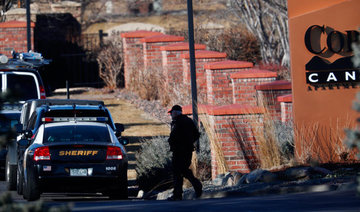DENVER: Videos made by the man who shot and killed a Colorado sheriff’s deputy after concerns were raised about his mental health show the gunman calling 911 and then opening his apartment door and talking to responding officers before the shooting.
The footage , livestreamed on Periscope, was obtained by Denver’s KUSA-TV. The station broadcast clips from two videos in which Matthew Riehl says he would not hurt anyone except to defend himself before calling authorities.
“Maybe I bought over 1,000 rounds of ammunition from Walmart. It’s not illegal,” he says.
Later, he tells a police dispatcher that a man had invited him to his house and was acting strangely.
When authorities arrive at Riehl’s suburban Denver apartment, the footage shows him talking to at least two officers, telling them he wants to file an emergency restraining order against his domestic partner. He is upset when one officer offers to give him a phone number to call, and leaves the doorway to go back into a room.
“Did you not get the message? Wow. They didn’t get the message. They lied,” he is heard saying on the video.
At another point, Riehl is seen holding a glass in his hand and says he’s had two scotches. He is heard saying that drinking would help him defend himself if someone bothers him.
The TV station said Douglas County Sheriff Tony Spurlock verified the authenticity of the videos and said the 911 call made by Riehl was the second one from his apartment in Highlands Ranch, 16 miles (about 25 kilometers) south of Denver, on Sunday.
The first 911 call was made by Riehl’s roommate, who told authorities Riehl was acting strangely and might be having a mental breakdown. Responding deputies to that call found no evidence of a crime and left.
The footage shows the shooting but the station did not air that footage. A clip purporting to show it has been posted elsewhere online.
Riehl, an attorney and an Iraq war veteran, previously posted videos criticizing Colorado law enforcement officers in profane, highly personal terms.
Wyoming College of Law students had been warned about Riehl, a former student, because of his social media posts critical of professors at the school in Laramie.
A Nov. 6 email from Assistant College of Law Dean Lindsay Hoyt told students to notify campus police if they spotted Riehl or his car near campus, KTWO-AM in Casper, Wyoming, reported. In addition, security on campus was increased for several days.
Campus officers called police in Lone Tree, Colorado, in mid-November to warn them about Riehl, suggesting his rants were indicative of mental illness, UW Police Chief Mike Samp told The Denver Post.
Samp said it’s possible that Colorado authorities faced the same issue as Wyoming officials when an apparently mentally ill, dangerous person makes indirect threats.
The deputy’s slaying was the most recent in a string of fatal shootings involving suspects who may have had mental health problems, and the state has expanded services in hopes of finding a solution.
Colorado opened 12 walk-in mental health crisis centers across the state and set up a 24-hour hotline after a gunman killed 12 people in a suburban Denver movie theater in 2012. Doctors testified the gunman, James Holmes, was mentally ill.
The Colorado Office of Behavioral Health has said more than 580,000 people have taken advantage of the expanded services, going to a crisis center or calling or texting the hotline or a separate help line for less urgent cases.
Riehl was licensed as a lawyer for five years in Wyoming and voluntarily gave up his license in 2016, said Wyoming Bar Association executive director Sharon Wilkinson.
He practiced at a law firm in the small city of Rawlins and later opened his own practice but withdrew from the bar in October 2016, making him ineligible to practice law in the state, Wilkinson said. That’s the same year records indicate he moved back to Colorado.
Wilkinson says the bar received no complaints about Riehl.
Authorities have said he fired more than 100 rounds before he was killed by a SWAT team.
Riehl, armed with a rifle, wounded four deputies, including Zackari Parrish in the initial gunfire. The other three deputies managed to get away but had to leave Parrish behind because of their injuries and the ongoing gunfire. Parrish later was declared dead.
About 1.5 hours later, the SWAT team arrived and exchanged fire with Riehl. He was killed and a fifth officer was wounded.
Two people in nearby apartment units were also wounded sometime during the prolonged standoff.
Man who killed Colorado deputy livestreamed himself
Man who killed Colorado deputy livestreamed himself

Producer of dropped BBC Gaza documentary says broadcaster tried to gag him

- In a post on LinkedIn, Ben de Pear said he declined to sign the BBC ‘double gagging clause’ multiple times
- The corporation shelved ‘Gaza: Doctors Under Attack’ amid widespread criticisms over controversial decision
LONDON: The executive producer of a shelved BBC documentary on Gaza has accused the corporation of attempting to silence him over its controversial decision to pull the film.
Ben de Pear, former editor of Channel 4 News and executive producer of “Gaza: Doctors Under Attack,” said he was repeatedly pressured to sign what he called a “double gagging clause” that would have barred him and others from speaking about the BBC’s decision to drop the film.
“I rejected and refused to sign the double gagging clause the BBC bosses tried multiple times to get me to sign,” de Pear wrote in a LinkedIn post.
“Not only could we have been sued for saying the BBC refused to air the film (palpably and provably true) but also if any other company had said it, the BBC could sue us.
“Not only could we not tell the truth that was already stated, but neither could others. Reader, I didn’t sign it.”
Describing the film’s production as a “painful journey,” de Pear previously accused Tim Davie, BBC’s director general, of taking editorial decisions he was not qualified to make.
“All the decisions about our film were not taken by journalists, they were taken by Tim Davie,” he said at conference in Sheffield. “He is just a PR person. Tim Davie is taking editorial decisions which, frankly, he is not capable of making.”
He accused the BBC of “failing as an institution,” calling for Davie and the corporation’s senior leadership to step down.
While the BBC has not officially responded, The Guardian reported that sources close to the matter denied the broadcaster tried to gag de Pear.
One insider said the request was a standard clause requiring producers to seek BBC approval before promoting its content — a claim disputed by de Pear’s company, Basement Films.
The controversy comes amid broader criticism of the BBC’s handling of Gaza-related coverage.
This includes backlash over its decision to drop “Gaza: Doctors Under Attack” because it “risked creating a perception of partiality,” its refusal to broadcast a performance by Irish rap trio Kneecap — one member of whom faces terror charges — and its failure to interrupt the Glastonbury live feed featuring anti-Israel chants by punk-rap duo Bob Vylan.
On Wednesday, over 400 media professionals — including 111 BBC journalists — signed an open letter accusing the BBC of acting as “PR for the Israeli government” and calling for the removal of BBC board member Robbie Gibb, citing conflicts of interest and editorial bias.
The letter also questioned Gibb’s alleged role in the BBC’s decision to drop the Gaza documentary.
Before pulling “Gaza: Doctors Under Attack” entirely, the BBC said it had delayed the film’s broadcast pending a review of another program, “Gaza: How to Survive a Warzone.”
Channel 4 ultimately aired “Gaza: Doctors Under Attack” on Wednesday night to critical acclaim.
Hundreds of media figures accuse BBC of acting as ‘PR’ for Israel, urge removal of board member

- Open letter by media professionals, BBC staff say Gaza coverage ‘falls short’ of editorial standards
- Sir Robbie Gibb, former chief of Jewish Chronicle, accused of ‘ideological allegiances’ to Israel
LONDON: Hundreds of media professionals, including over 100 current BBC staff, have signed an open letter accusing the broadcaster of acting as “PR for the Israeli government,” and called for the removal of BBC board member Sir Robbie Gibb over alleged conflicts of interest.
The letter, sent to BBC Director-General Tim Davie and the broadcaster’s board, follows a string of controversies — including the BBC’s live broadcast of anti-Israel chants by the punk-rap duo Bob Vylan at Glastonbury, and the decision to pull a commissioned documentary on Gaza.
“All too often it has felt that the BBC has been performing PR for the Israeli government and military. This should be a cause of great shame and concern for everyone at the BBC,” the letter stated.
The signatories — which include actress Miriam Margolyes, filmmaker Mike Leigh, actor Charles Dance, and historian William Dalrymple — claim the BBC’s coverage of Gaza “falls short” of its editorial standards and fails to reflect the reality on the ground.
The letter also raises concerns over the BBC’s decision to withdraw from airing “Gaza: Doctors Under Attack,” a documentary it originally commissioned, which will now be broadcast by Channel 4.
The BBC said it pulled the film because it “risked creating a perception of partiality.”
“This appears to be a political decision and is not reflective of the journalism in the film,” the letter stated. “This illustrates precisely what many of us have experienced first hand: an organisation that is crippled by fear of being perceived as critical of the Israeli government.”
Much of the criticism focuses on Gibb, a former head of the BBC’s Westminster political team and ex-spin doctor for Prime Minister Theresa May.
Gibb helped lead the consortium that purchased The Jewish Chronicle in 2020 and served as a director until August 2024.
The letter describes his position on the BBC board — including on the editorial standards committee — as “untenable,” citing the Jewish Chronicle’s alleged history of publishing “anti-Palestinian and often racist content.”
The letter accuses Gibb of a conflict of interest and highlights what it sees as a double standard: “For many of us, our efforts have been frustrated by opaque decisions made at senior levels of the BBC without discussion or explanation. Our failures impact audiences.
“As an organisation we have not offered any significant analysis of the UK government’s involvement in the war on Palestinians. We have failed to report on weapons sales or their legal implications. These stories have instead been broken by the BBC’s competitors.”
The statement alleges Gibb has a “conflict of interest” which “highlights a double standard for BBC content makers who have themselves experienced censorship in the name of ‘impartiality.’”
The letter further stated: “In some instances staff have been accused of having an agenda because they have posted news articles critical of the Israeli government on their social media.
“By comparison, Gibb remains in an influential post with little transparency regarding his decisions despite his ideological leanings being well known. We can no longer ask licence fee payers to overlook Gibbs’s ideological allegiances.”
A BBC spokesperson said: “Robust discussions amongst our editorial teams about our journalism are an essential part of the editorial process.
“We have ongoing discussions about coverage and listen to feedback from staff and we think these conversations are best had internally.
“Regarding our coverage of Gaza, the BBC is fully committed to covering the conflict impartially and has produced powerful coverage from the region.”
The spokesperson added that in addition to “breaking news, ongoing analysis, and investigations,” the BBC has produced award-winning documentaries such as “Life and Death in Gaza,” and “Gaza 101.”
Paramount to pay $16 million in settlement with Trump over ‘60 Minutes’ interview

- Paramount said the money will go to Trump’s future presidential library, not to the president himself
NEW YORK: In a case seen as a challenge to free speech, Paramount has agreed to pay $16 million to settle a lawsuit filed by President Donald Trump over the editing of CBS’ ” 60 Minutes” interview with then-Vice President Kamala Harris in October.
Paramount told media outlets the money will go to Trump’s future presidential library, not to the president himself. It said the settlement did not involve an apology.
Trump’s lawyer said the president had suffered “mental anguish” over the editing of the interview by CBS News, while Paramount and CBS rejected his contention that it was edited to enhance how Harris sounded. They had sought to get Trump’s lawsuit dismissed.
There was no immediate word from the White House about the settlement of the case, which Trump filed in Amarillo, Texas.
The case has been closely watched by advocates for press freedom and by journalists within CBS, whose lawyers called Trump’s lawsuit “completely without merit” and promised to vigorously fight it after it was filed.
In early February, “60 Minutes” released a full, unedited transcript of the interview.
Under the settlement reached with help of a mediator, Paramount agreed that “60 Minutes” will release transcripts of future interviews of presidential candidates, “subject to redactions as required for legal and national security concerns,” CBS News cited the statement as saying.
Trump, who did not agree to be interviewed by “60 Minutes” during the campaign, protested editing where Harris is seen giving two different answers to a question by the show’s Bill Whitaker in separate clips aired on “60 Minutes” and “Face the Nation” earlier in the day. CBS said each reply came within Harris’ long-winded answer to Whitaker, but was edited to be more succinct.
The president’s lawyer, Edward Andrew Paltzik, said that caused confusion and “mental anguish,” misleading voters and causing them to pay less attention to Trump and his Truth Social platform.
Paramount and controlling shareholder Shari Redstone were seeking the settlement with Trump, whose administration must approve the company’s proposed merger with Skydance Media. CBS News President and CEO Wendy McMahon and “60 Minutes” executive producer Bill Owens, who both opposed a settlement, have resigned in recent weeks.
The Freedom of the Press Foundation, a media advocacy group that says it is a Paramount shareholder, has said that it would file a lawsuit in protest if a settlement was reached.
In December, ABC News settled a defamation lawsuit by Trump over statements made by anchor George Stephanopoulos, agreeing to pay $15 million toward Trump’s presidential library rather than engage in a public fight. Meta reportedly paid $25 million to settle Trump’s lawsuit against the company over its decision to suspend his social media accounts following the Jan. 6, 2021, riot at the US Capitol.
Asharq to bridge US-Arab divide with new Arabic politics podcast

- America Bi Lahjetna (“America in Our Dialects”) is the first journalist-led Arabic-language political podcast produced in the US capital
- Hosted by Hiba Nasr, Zena Ibrahim, Kareem Yousry, and Azouz Allilou, the show dives into American political developments with fresh, localized insight
RIYADH: From the heart of Washington DC, Asharq Podcasts launches America Bi Lahjetna, which translates to “America in Our Dialects”, the first journalist-led Arabic-language political podcast produced in the US capital. The show delivers weekly episodes that bring American headlines closer to home, in a voice that speaks directly to the region.
Hosted by Hiba Nasr (Bureau Chief), Zena Ibrahim (Reporter and Producer), Kareem Yousry (Reporter and Producer), and Azouz Allilou (Reporter and Producer), the show dives into American political developments with fresh, localized insight. Each episode moves beyond the headlines to draw meaningful connections to the realities, concerns, and interests of Arab audiences across the region — precisely when and where it matters most.
In line with growing demand for content that feels less formal, simpler, and more conversational, America Bi Lahjetna moves away from traditional news delivery. Instead, it offers a smart, approachable format that reflects how today’s audiences, especially younger listeners — consume political content: through relatable voices, contextual storytelling, and accessible language.
“This podcast isn’t about translating the news, it’s about explaining why it matters to us,” said Hiba Nasr, Asharq’s Washington Bureau Chief.
“Every week, we unpack the headlines that dominate the American conversation and connect them to the Arab world, politically, emotionally, and strategically. From our base in Washington, we bring clarity to a chaotic media landscape and give our region both a window into and a voice within US political discourse. That’s what makes America Bi Lahjetna different. We’re not observers. We’re participants.”
In its first episodes, the team breaks down some of the most pressing stories in US politics, offering Arab audiences’ critical context often missing from international coverage, and linking Washington’s decisions to their regional implications.
America Bi Lahjetna is now streaming on YouTube and Asharq NOW.
Screening of ‘Rewriting Arab News’ documentary held at EU Embassy in Riyadh

- Film focuses on relaunch of Saudi Arabia’s first English-language daily and its coverage of the Kingdom’s reforms
- EU Ambassador: “You are part of Vision 2030 and many of you in this room are an embodiment of this new Saudi Arabia”
- Faisal J. Abbas: “This documentary tells a small — albeit an exciting — chapter in the history of our newspaper and the country”
RIYADH: A special screening of the documentary “Rewriting Arab News” took place at the EU Embassy in Riyadh on Tuesday as part of the 50th anniversary celebrations of Saudi Arabia’s first English-language newspaper.
The film, presented by the London-based Global Arab Network, sheds light on the 2018 relaunch of Arab News, at a time when the Kingdom itself was transforming.
A ceremony, held in honor of Arab News, was attended by European ambassadors to Saudi Arabia and other notable guests, including Saudi dignitaries, diplomats, policymakers, media industry professionals, and staff of the Arab News Riyadh bureau.
Speaking at the ceremony, Christophe Farnaud, the EU ambassador to Saudi Arabia, said: “It’s a great pleasure to be here with you on … the 50th anniversary of Arab News.”
He added: “You don’t just cover the news; you also analyze them. You decipher what’s going on in the world, in the Kingdom, in the region. And you also allow dialogue and comments. And you are an open space, which I think every country needs.
“And I think it comes at the very right time, right now in the Kingdom. So, when you are also part of Vision 2030 and I must say this new Saudi Arabia and many of you in this room are an embodiment of this new Saudi Arabia.

“It is something that we not just support, but also, admire, in a way, my European colleagues, they came tonight in numbers — I think would share what I’ve just said.
“Once again I want to congratulate you and your team at Arab News for your work.”
Also speaking at the ceremony, Arab News’ Editor-in-Chief Faisal Abbas said: “On behalf of the Arab News family, we wish to extend our gratitude to the EU ambassador in the Kingdom for hosting this screening occasion as part of our 50th anniversary celebrations this year.
“This documentary tells a small — albeit an exciting — chapter in the history of our newspaper and the country as it accounts for an exciting and transformative period in our country’s progress.
“Of course, Arab News would have not been where it is today without the hard work, passion and dedication of my predecessor editors in chief, and of course, not without our founders — the Hafez Brothers — who started the newspaper in 1975.”
Part of the documentary is narrated by Prince Turki Al-Faisal, the former Saudi ambassador to the US, who in the film delves into the paper’s origins.

Arab News was established in Jeddah in 1975 by brothers Hisham and Mohammed Ali Hafiz under the slogan to give Arabs a voice in English while documenting the major transformations taking place across the Middle East.
In April 2018, Arab News changed its 43-year-old logo with a new one as well as its motto to “The Voice of a Changing Region.” The newspaper relaunched with a new design and a new approach to stories that it believed was better suited to the internet age.
In June, an event hosted by the Global Arab Network at the Frontline Club in London paid tribute to Arab News and its founders by screening a preview of the documentary for leading editors, reporters, diplomats, and analysts.
Asked following Tuesday’s screening whether he believed the documentary reflected the changes that had been taking place in the region, EU Ambassador Farnaud said: “I would say even more. I mean, it’s one of the embodiments of these changes.
“The Kingdom is undergoing incredible changes. And so is Arab News. And I particularly appreciated, by the way, the historical dimension when it was created in 1975, that was also a project corresponding to the new role of the Kingdom, in a way.
“And yes, now the Kingdom has entered a new phase, a spectacular phase of transformation. And we see that Arab News, in its own ways, is also going through a huge phase of transformation and a successful one at that.
“I was really impressed.”
Also responding to the film, Saudi philanthropist Ameera Al-Taweel said: “A lot of the transformational story for Arab News reminded me of the transformation that was happening in Saudi Arabia back in 2015, 2016 to get to Vision 2030.

“It was right around that time that Arab News was also transforming. It’s very interesting how it aligned with a youthful leader (Crown Prince Mohammed bin Salman) who was injecting a lot of changes, believing in the younger generation, believing in keeping the legacy, but building on it.
“So a lot of what I saw in Vision 2030 and of course, His Royal Highness Crown Prince Mohammed bin Salman, you see it happening in the private sector or the public sector, even in the journalism sector, and the transformations that have that are happening in it.”
Although she only moved to the region in the spring, Ville Linnala, deputy head of mission at the Embassy of Finland, said the film raised pertinent issues.
“I have been in Riyadh and Saudi Arabia since May 5, so I’m very fairly fresh in the region, but I can really see these issues that were mentioned and raised in the documentary,” she said.
“For example, of course, when it comes to women’s rights and all these kinds of things, and with the Saudi Vision 2030 happening and moving forward.
“It was really, really, really interesting to see. I enjoyed this documentary a lot, so much.”
“Rewriting Arab News” is a short film about the newspaper’s relaunch and digital transformation between 2016 and 2018, presented by Global Arab Network.




















